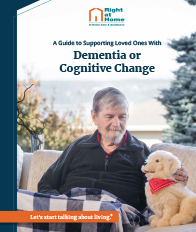Dementia and Alzheimer's During a Pandemic
Dementia and Alzheimer's During a Pandemic
What is Dementia? Dementia is a complex group of symptoms that affects the way the brain works. Brain cells are irreversibly damaged and can impair language, behavior, and memory recall. Although there are many medications available to help delay the destruction of neurons in the brain, this perplexing set of conditions are chronic and progressive. People with dementia often have trouble with short-term memory loss and essential daily activities such as:
- preparing meals
- paying bills
- planning and organizing
- problem-solving/critical thinking
You may be most familiar with Alzheimer's Disease, the most common type of dementia. It "accounts for most of the chronic confusional states that occur in people older than 65 years" (Ignatavicius & Workman, 2016). Alzheimer's' Disease is grouped into three stages according to the progress of the disease:
- Stage I – Early/mild
- Stage II – Middle/moderate
- Stage III – Late/severe
Although it is important to encourage your senior loved ones to be as independent as possible, Right at Home Boston and North would like to provide you with the resources you need for safety and prevention regarding Dementia and Alzheimer's Disease.
Safe and Effective Care Environment
So how can we communicate with our senior loved ones effectively and promote a safe environment?
- Avoid open-ended questions. Try using "yes or no" questions.
- Incorporate pictures in your instructions instead of just speaking.
- Limit choices. Too many choices can cause confusion and frustration.
- Remove small area rugs in the home to prevent falls.
- Minimize clutter in the home.
- Use single-date calendars to promote orientation.
- Maintain a routine.
- Break large projects or tasks down into smaller steps.
Although social distancing stipulations are still enforced, Right at Home Boston and North would like to encourage you and your senior loved ones to participate in our fun virtual activity over at Memory Café. Making friends is still possible even during a pandemic! Take a look at our schedule and have a great week!

Dementia or Cognitive Change Guide
A free downloadable guide for those supporting loved ones with Dementia or Cognitive Change
Ignatavicius, D. D., & Workman, M. L. (2016). Medical-Surgical Nursing. Patient-centered collaborative care. St. Louis, MO: Elsevier.
- https://www.webmd.com/alzheimers/types-dementia#2-5
- https://www.mayoclinic.org/diseases-conditions/dementia/symptoms-causes/syc-20352013



